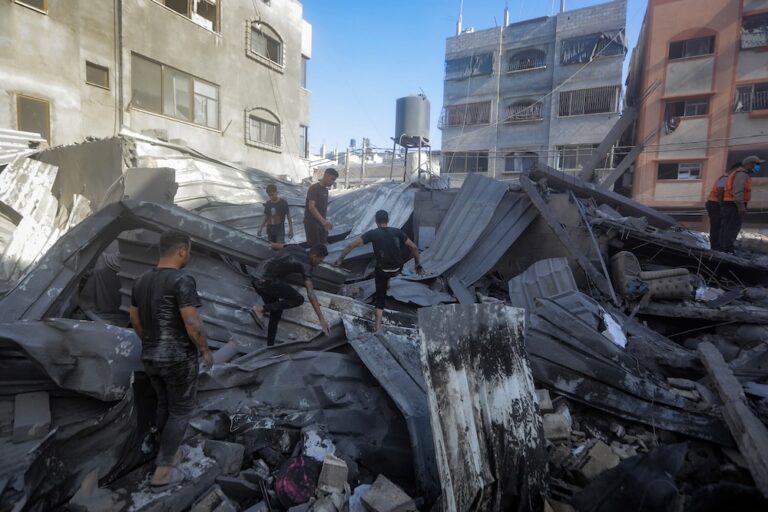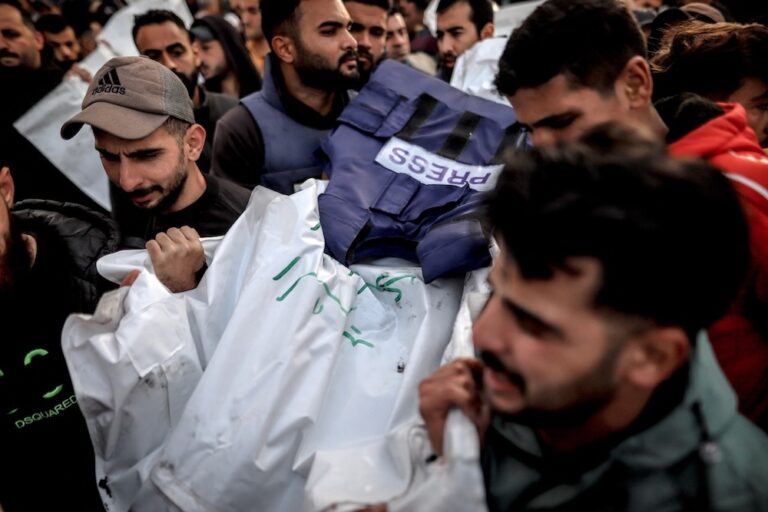(RSF/IFEX) – In a letter to President Yasser Arafat, RSF protested the closure of five private broadcasters and the arrest of four journalists in the territories under Palestinian authority. RSF Secretary-General Robert Ménard asked the president to do everything in his power to secure the immediate release of the two journalists still detained, Abdullah Issa […]
(RSF/IFEX) – In a letter to President Yasser Arafat, RSF protested the closure of five private broadcasters and the arrest of four journalists in the territories under Palestinian authority. RSF Secretary-General Robert Ménard asked the president to do everything in his power to secure the immediate release of the two journalists still detained, Abdullah Issa and Maher Alami, and the reopening of two television stations, Al Nasr TV and Al Mahed. The organisation recalled that these measures are in complete violation of the press law, signed by President Arafat in 1995, which stipulates that the intelligence service does not have the right to interrogate, arrest or detain Palestinian journalists in the course of their work.
On 17 April 2000, intelligence officers arrested Issa. He has been held without charge since then. The arrest is apparently connected with a series of reports criticising the Palestinian Authority. In particular, the journalist had carried out an interview with Intesar Al Wazir, the solidarity minister, in which the minister questioned Arafat’s authority.
On 5 May, the Palestinian police ordered the closure of the privately owned radio station Al Hob Wa Alsalam in Ramallah. Two days earlier the station had broadcast an interview with a representative of striking teachers. It was back on the air a week later.
On 21 May, also in Ramallah, police had the privately-owned television station Al Watan shut down. No reason was given to the director, Omar Nazal, who was arrested and held for an hour. The channel was allowed to resume broadcasting a few days later.
On 27 May, Fathi Barqawi, news editor of the public radio station The Voice of Palestine, was arrested in Ramallah. Police reportedly accused him of “provocation” and of libelling President Arafat. He was not released until ten days later.
On 30 May, the privately owned television station Al Nasr and the private radio station Al Manara were targets of the same sanctions in Ramallah. A few days later, a police official said that the closures resulted from the broadcasters’ criticism of the Palestinian Authority. On 31 May, the authorities told Al Manara that it could resume broadcasting.
On 2 June, the police closed the privately owned television station Al Mahed in Bethlehem and arrested its director, Samir Qoumsaiah, who is also chairman of the Palestinian Private Television Union. After it was closed on 21 May, Al Watan had called on all private channels to broadcast a half-hour message protesting this latest police sanction against private media. Qoumsaiah was released on 5 June.
On 6 June, freelance journalist Alami was arrested by the security services in Ramallah. Earlier he had been questioned about articles he had written and comments he had made on television that were critical of the Palestinian Authority.


